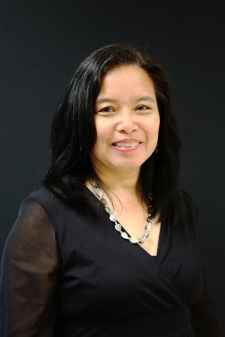Leading Care: Dr. Margaret Hattori-Uchima and the University of Guam School of Health
In this interview, Margaret Hattori-Uchima '13 PhD, RN discusses her leadership in advancing nurses and health care through higher education.
She is Dean, University of Guam School of Health since March 2014 and has oversight of the Nursing, Social Work, and Health Science undergraduate degree programs in the School.

How did you rise to this leadership position?
I had been a faculty member since 2001, when I returned to Guam after 17 years in Hawaii and California. I enjoyed teaching and became Division Chair in 2010 and gained administrative experience. After obtaining my PhD, I was encouraged to become the Interim Director of the School to fill the vacancy left when our former Director relocated to the U.S. Mainland in 2010. After becoming the Interim Director, the University elevated the position to that of Dean. I applied and have been Dean since 2014. As a faculty member, and Division Chair, I also chaired several nursing program committees, including Program Evaluation, and Nursing Curriculum. I participated in University level committees and also became co-investigator on several interdisciplinary health related grants. This enabled me to work with others across the University and network. I had been encouraged to become the Dean by the Senior Vice President and other University administrators. I was reluctant but knew that the University needed assistance.
Who influenced you?
I was greatly influenced by Dr. Nancy Sharts-Hopko, Dr. Suzanne Smeltzer, and Dr. Linda Copel. The PhD program opened my eyes to the vast opportunities in nursing and the importance of academia, research, and nursing leadership while maintaining the strong values of community, caring and commitment.
Why is it important to you? Why are you enthusiastic about your work in this role?
The island of Guam suffers from a huge nursing workforce shortage. We also have a crisis of non-communicable diseases impacting our populations on Guam and in Micronesia. I am often asked why I returned to Guam to work, when there are many opportunities in the U.S. mainland. Our Pacific Island peoples deserve opportunities, quality health care and a strong nursing workforce that is willing to provide the best care possible. I must be a part of the solution to the many problems affecting our island and region. Nursing leadership provides the means for me to make impactful change at an individual, organizational, and community level. Nursing is an amazing profession!
What are the issues you deal with and what’s the biggest challenge in your area?
The biggest challenge is trying to meet the myriad of needs of our island community. The health disparities facing Guam and the Micronesian islands are daunting. The nursing shortage feels insurmountable. But I have hope that our nursing education programs and our health care infrastructure can improve to enable us to educate more nurses.
How are you effective in your role? What’s critical to your success in the role?
I believe in dreaming that health care systems can improve, and in making a difference in the lives of people in our community. My success lies in surrounding myself with people that have a similar vision. Our faculty in the nursing, social work, and health sciences programs are committed to improving the quality of life for our populations- this commitment results in having education programs with high standards and positive outcomes for our graduates. We are successful because being a Dean or being a faculty member or staff of our School is more than a job. It is a vocation and commitment to improve our island.
How does innovation fit into your role as leader?
I believe that a leader should set goals for the organization and work systematically to achieve those goals. With the support of committed and highly skilled nursing faculty and staff, we have been able to make innovative changes to our program that has resulted in amazing outcomes. The innovation lies in our sense of community and being responsive to the needs of our island and regional communities. I believe in dreaming that health care systems can improve, and in making a difference in the lives of people in our community.
What’s your hope for our profession?
My hope for our profession is that we will continue to make changes in policy and practice that ultimately change the U.S. healthcare system. This broken system needs the philosophy of caring and value of human dignity that is the heart of the nursing profession. People need our help, and we can make a difference.
